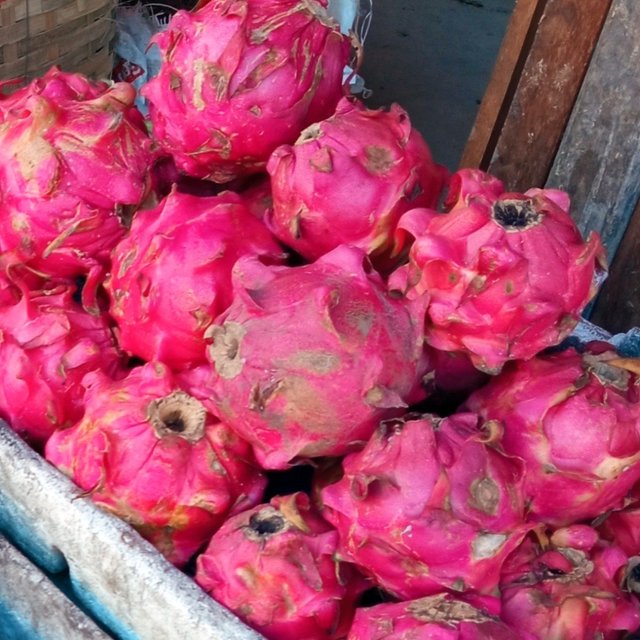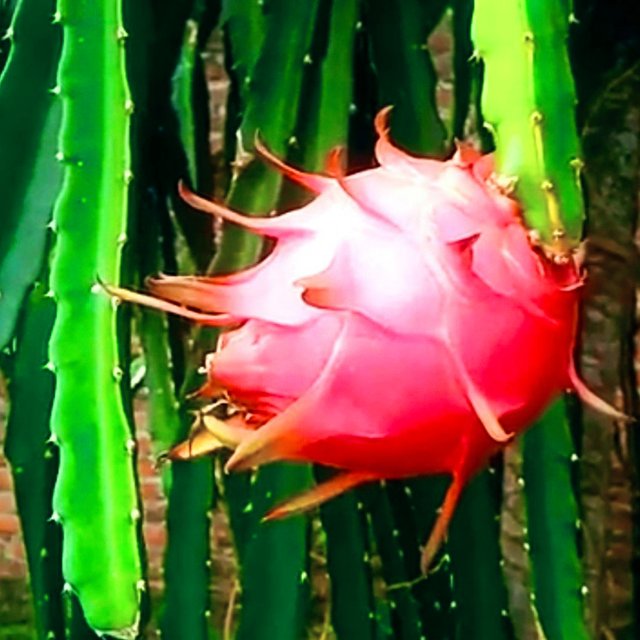
Well, Global Steem friends, the morphology of the dragon fruit plant consists of roots, stems, thorns, flowers and fruit. The roots of dragon fruit are just fibrous roots that grow in the soil. On the upper stem as hanging roots. With roots that grow along the stem on the back of the fins at the corner of the stem, on the thorns there will grow flowers that are similar in shape to the wijayakusuma flower. Well, these non-falling flowers will develop into fruit.

Dragon fruit is round, slightly oval, the same size as an avocado. The skin of the fruit is bright red for the white and red dragon fruit types. And dark red for the black dragon fruit, and yellow for the yellow dragon fruit. The entire skin is covered with tassels, which are analogous to dragon scales. Therefore, this fruit is called dragon fruit.
The stem is triangular, the thorns are very short and inconspicuous, so it is often considered a thornless cactus. The flowers bloom at dusk and when they bud, the flowers are already about 31 centimeters in size.
This dragon fruit is rich in benefits, namely the fruit contains fiber. The fiber contained in dragon fruit can lower cholesterol levels and is useful for the digestive system. In addition, the red flesh of the dragon fruit is very good for the sense of sight. Because the flesh of the dragon fruit contains carotenoids and phytochemicals. So it can reduce the risk of cancer. In addition, this fruit can be eaten directly, but it can also be processed into food ingredients. Among them are those made into dragon fruit soup, or dragon fruit salad. However, the most frequently used fruit is for making drinks.
This plant is more suitable to be planted in dry areas, rather than areas that have a wet climate. Because if planted in areas with a wet climate, this plant will be easily attacked by disease.
Myths and Benefits of Dragon Fruit
Dragon fruit has various benefits for the human body. The high vitamin C content is useful for increasing the body's immune system, and is good for skin health. In addition, there is an antioxidant content that is important for warding off free radicals that can trigger cancer. "Dragon fruit contains antioxidants such as flavonoids, then phenoid acids, and also anthocyanins and betacyanins. Betacyanins are what give dragon fruit its red color. One dragon fruit itself weighs approximately 350-400 grams. So one dragon fruit has around 200 calories." In addition to being consumed as a cut fruit, dragon fruit is also a healthy snack like smoothies. How to make it is very easy. So, the method is to blend the dragon fruit, and add bananas, berries, and grated coconut as a sweetener. Dragon fruit is added with papaya, granola and berries. You can also add tropical fruits such as starfruit, strawberries, and oranges.
"I prefer to consume it directly, because the vitamins have not been lost. Because it does not undergo a process. So, I divide the fruit in two, I just eat it."
Dragon fruit is also suitable for those who are on a diet, because it helps the digestive process to run smoothly. The benefit that I feel the most is to smooth digestion. So that's why I make sure that every week I eat 3 dragon fruits.
Meanwhile, the myth that dragon fruit is not good for pregnant women has been denied by a nutritionist. Dragon fruit, which is high in calcium and iron, can actually overcome the complaint of anemia that is often experienced by pregnant women.
Greetings always compact.
By @midiagam